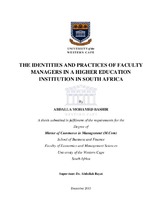The identities and practices of faculty managers in a higher education institution in South Africa
Abstract
This study addressed the identities and practices of faculty managers (FM) in a higher education institution (HEI) in South Africa. There is limited research on faculty managers in South African HEIs, specifically in relation to their self-formed ethically related identities and practices. My aim in this study was to fill this gap. Ethics as self-formation is related to how people construct themselves. As a result of changes in the managerial discourse in HEIs in South Africa, the new social identity of the faculty manager, which is a non-teaching professional social identity, has been created. At the same time, individuals have ethical aspirations that they bring with them when they occupy new management positions. These ethical values and aspirations influence how these individuals enact and fashion their identities at work. The major goal of this study was to explore how individuals who are faculty managers construct their ethically infused identities and enact their practices. In analysing the empirical evidence I used a Foucauldian ‘ethics of the self’ theoretical lens. In setting up and gathering the data for this study, I used the case study qualitative research approach in order to gain a contextual and deep understanding. The findings of this study show the various shapes and shades of ethically infused subjectivities that people who occupy the positions of faculty managers enact and instantiate. In addition, the study sheds light on the roles and responsibilities of faculty managers and shows the major contribution they make to the management and administration of higher education institutions.

